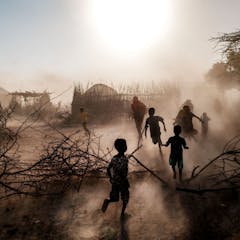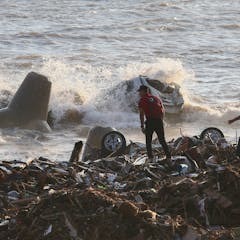
Artikel-artikel mengenai RandD
Menampilkan 81 - 100 dari 2987 artikel

The solo journey of a queer, black woman across the continent makes fascinating reading.

Risk-based taxes set tax rates based on the risk to health of tobacco and nicotine by relying on scientific evidence.

Given the dangers of mercury toxicity and the high exposure of miners and their communities, solutions are needed to reduce their exposure.

Mindfulness, being in the present moment, is often achieved through meditation, the practice of sitting still and focusing on the breath. Both help relieve feelings of anxiety and depression

The plant’s African past provides insight into emerging issues in humanity’s interactions with cannabis.

Few film-makers imagined Black women as a primary audience. This has changed over time.

Sunburn can cause cancer, heat stroke and changes to the immune system. Choosing the right sun protection, even for darker skin, is more complicated than it looks.

COP28 was Africa’s ‘most vocal COP ever’. African leaders’ assertiveness paid off with new climate finance deals being struck.

The African Food Systems Transformation Collective says COP28 must enable transition from fossil-fuelled food systems and leverage indigenous knowledge so that all can sustainably access good food.

Heat, floods and droughts create conditions for pathogens and their vectors.

The judgment leads the way in Africa, but the new leave policies favour high income groups. Mothers will still bear the brunt of child care in poor households.

Garbage is decomposing in landfill sites across sub-Saharan Africa, releasing methane gas. If governments harnessed this as clean energy, Africa would avoid environmental damage worth US$6.7 billion.

This year’s Blue Drop Audit report of water quality in South Africa has found that 46% of water supply systems are contaminated and over two thirds of wastewater treatment plants are close to failure.

South Africa’s plan to transition to green energy may eventually benefit big private companies more than ordinary citizens.

Africa can check climate impact on health by taking 37 actions endorsed by environment ministers.

Africans need to re-envision what climate resilient development means within unique African city contexts.

Shea is a key economic crop for poor women in the northern parts of Ghana.

COP28 gives Nigeria another chance to fight for financing it needs to adapt to climate change.

Nigeria’s medical community is mourning the death of public health physician and university administrator, Emeritus Professor Umaru Shehu.

Getting climate funds to frontline communities may require rich countries and the UN easing control over how the money is spent.
